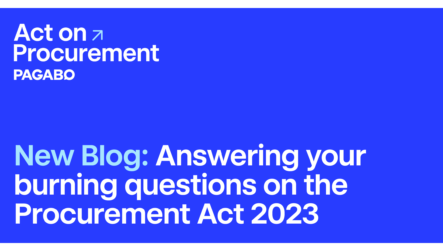Thoughts From: AtkinsReális – It’s not just the public sector: private organisations need to be prepared for the new Procurement Act

The Procurement Act 2023 comes into force on 24 February 2025, changing the rules that shape how public bodies buy goods and services. This follows recent publication of the National Procurement Policy Statement (NPPS) which sets out the wider policy objectives to which the government expects public procurement to contribute.
Content of the new Act
The Procurement Act will apply to new procurement only. Previous procurement will still be handled under PCR 2015,the existing Public Contracts Regulations Act, and other current procurement legislation. This includes frameworks until their last call-off is terminated, which could be up to 10 years until construction is completed.
AtkinsReális is a Lot 1 provider under Pagabo’s National Framework for Professional Services in Construction and Premises 2024 UK, which was procured under PCR 2015 Regulations and as such, remains a compliant route to market for contracting authorities. Moving forward, Pagabo’s frameworks are built to ensure full compliance with the Procurement Act 2023, including requirements for social value, sustainability, and ethical procurement, and help organisations navigate the new regulatory landscape.
The Act requires procurement teams to award the contract to ‘the most advantageous tender (MAT) that the contracting authority considers:
- Satisfies their requirements, and
- Best satisfies the award criteria by reference to the assessment methodology and the relative importance of the criteria.’
The key principles are to deliver value for money, maximize public benefit, and procure with integrity while treating bidders equally. There is greater emphasis on transparency, supplier performance and non-financial criteria such as quality, local job creation and environmental impact.
Monitoring and reporting on performance is now much more prominent, and aligned to the three (or more) KPIs that public contracting authorities must establish and publish for most contracts over £5m (including VAT).
Early supplier engagement (ESE) is encouraged and this should be welcomed by all parties, so as to achieve the planned outcomes and value for money. Investing time in ESE can lead to more effective designs, reducing changes and potential cost increases downstream as a way to achieve faster delivery within the design and construction stages.
Where does social value fit into the new Procurement Act?
The Act aims to introduce measures to ‘improve and streamline the way procurement is done and benefit prospective suppliers of all sizes’, including SMEs and social enterprises’. So far, so good. The NPPS notes that consideration of the procurement policy objectives should be appropriate, proportionate and relevant, acknowledging that there are circumstances in which the policy objectives are irrelevant or disproportionate to a specific procurement. This seems reasonable. It’s also encouraging that the NPPS emphasizes equitable treatment of suppliers and consideration of barriers for SMEs.
Although the Act and the NPPS strengthen alignment between procurement and social value, there remains a lack of standardized guidance on how to implement social value plans and activities. Contracting authorities are still finding themselves ill-equipped to devise their own social value strategy and implement it operationally. Any procurement exercise undertaken by a contracting authority should allow for the societal and economic needs of the area where the contract term will be delivered. Every contracting authority should have a policy explaining their specific social value needs, and how these should be considered within their procurement. This policy should be an explicit requirement, stated in the NPPS.
Framework providers such as Pagabo can help contracting authorities meet the Procurement Act 2023’s focus on social value and sustainability by providing contracting authorities access to suppliers, similar to AtkinsReális, who are committed to delivering positive societal impacts.
Preparation
As a private sector organisation that advises a substantial public sector client base, we’re reviewing our procurement activities to ensure they remain compliant and transparent under the new rules. Like other organisations, we need to examine these through commercial, contractual and reputational lenses.
As an industry, we all have work to do on this, to get to up to speed and familiarize ourselves with the new procurement rules. The private sector should be putting processes and governance in place. The public sector needs to continue updating policies and digital systems, as well as producing new procurement templates. Both sectors should be training staff. Organisations such as Pagabo will be key to helping both the public and private sectors navigate the evolving procurement landscape, the recent launch of their ‘Act on Procurement’ campaign reflects their commitment to helping the public sector stay compliant whilst improving procurement practices.
This all means a busy time ahead, but hopefully by working together we will achieve the outcomes that the Procurement Act set out to reform the public procurement system: enhance efficiency; ensure fairness; deliver better value for money; promote competition; improve transparency, and support the national strategic priorities.
Discover our frameworks


































